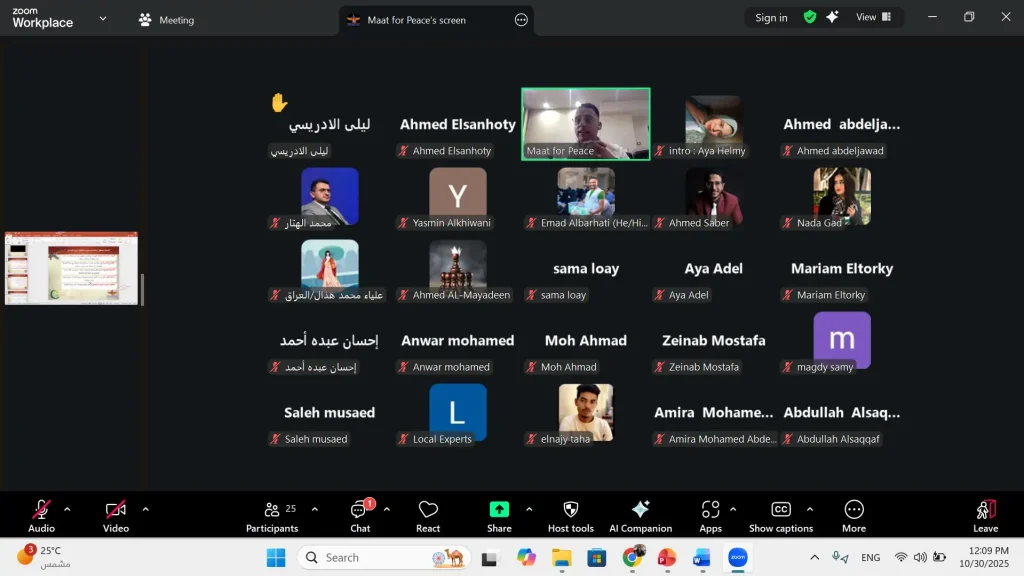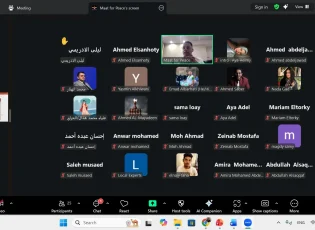Last week, seminars for citizens continued, aimed at raising their awareness of decentralization and good local governance and discussing the problems of their communities, which is one of the components of the program to raise citizens' awareness of decentralization in six governorates, which aims to reach about ten thousand citizens through public discussion panels and simplified guidebooks.
Where the Maat Foundation for Peace, Development and Human Rights held the first discussion session for citizens in the Al-Tebeen neighborhood in Helwan governorate, on the evening of Thursday, December 23, 2010, with the participation of dozens of citizens from the areas of the Tebbin neighborhood, and this comes in the context of the activities of the Citizen's Voice (2) project implemented by the Maat Foundation for Peace Development and human rights, funded by the Future Foundation, which seeks to build the capacities of different societal parties in dealing with decentralization, and to develop effective and innovative mechanisms to monitor the needs of citizens and evaluate the quality of public services provided by the executive authorities. The project will also work to spread the culture of decentralization in Egyptian society and the effective employment of means Local and public media in support of decentralization and monitoring the needs of citizens
During the seminar, citizens were introduced to decentralization and good local governance and the variables associated with them, the rights of the citizen to the local government bodies in light of the implementation of decentralization, and the responsibility of these authorities for providing public services of appropriate quality, and the seminar also included a presentation of the services that the responsibility for their full performance will fall on the local government bodies. In addition, during the seminar, the most important problems that the citizens suffer from in the Al-Tebeen neighborhood were presented, the most important of which was the poor distribution of bread and the citizens' objection to the performance of the company responsible for this process, in addition to the large number of areas deprived of the services of lighting the main and public roads and the recurrence of incidents of theft of columns and lighting lamps As a result of negligence by responsible local authorities.
In a related context, last week witnessed the first meeting of its kind between local popular councils and civil organizations, as a direct result of the efforts of the Citizen's Voice project in working with the two parties. The meeting was held at the headquarters of the Local People's Council in Zagazig at the invitation of the Speaker of the Council and a number of members, in which representatives of three councils participated. Local people in the center and city of Zagazig in the Sharkia governorate, as well as representatives of the Regional Union of NGOs in Sharkia Governorate, representatives of a number of NGOs located within the center, in addition to both Mr. Ayman Aqil, Chairman of the Board of Trustees of Maat Foundation, and Mr. Walaa Jad Al-Karim, Director of the Citizen's Voice Project .
The Maat Foundation had held a training workshop for members of local popular councils in Zagazig on December 10 and 11, and then the members participating in the workshop submitted requests to their councils to which they belong to develop a framework for cooperation between local popular councils and civil organizations with regard to serving citizens. The Eastern Youth Association coordinates the work of this meeting, which aimed to discuss aspects of cooperation and agree on specific mechanisms to be followed during the next stage.
The participants agreed on a number of items that are considered a quantum leap in the work of local bodies and their cooperation with NGOs, and to a large extent achieve the goals and objectives of good local governance and are fully compatible with the trend towards more decentralization and the necessity for the active and full participation of citizens and civil society organizations in the process. Decision-making, and among the most important items that have been agreed upon are the following: -
1- The two parties will cooperate, with technical assistance from the Union of NGOs and the Directorate of Social Solidarity, in enumerating and classifying civil organizations located within the scope of the center, in order to facilitate the process of communicating with them.
2- The Local People's Councils Bureau Commission (the highest body in the Council) invites a number of representatives of NGOs to participate in the Commission’s meetings and express opinions on the issues raised.
3- The local popular councils assign the implementation of some development projects or participation in their implementation to NGOs.
4- The civil organizations transfer the complaints received from citizens and the results of field research they conduct regarding violations of the citizens' economic and social rights to the local people's councils office body for formal discussion within the council.
5- The council shall form a committee to remove the obstacles and problems encountered by some civil organizations within the scope of the center, and assume the task of solving these problems before the executive authorities.
It is expected that the cooperation framework to be agreed upon will be activated in the coming days, especially since the local people's councils will soon begin to discuss local budgets and distribute the allocations included in the local development budget.
shortlink: https://maatpeace.org/en/?p=30626











